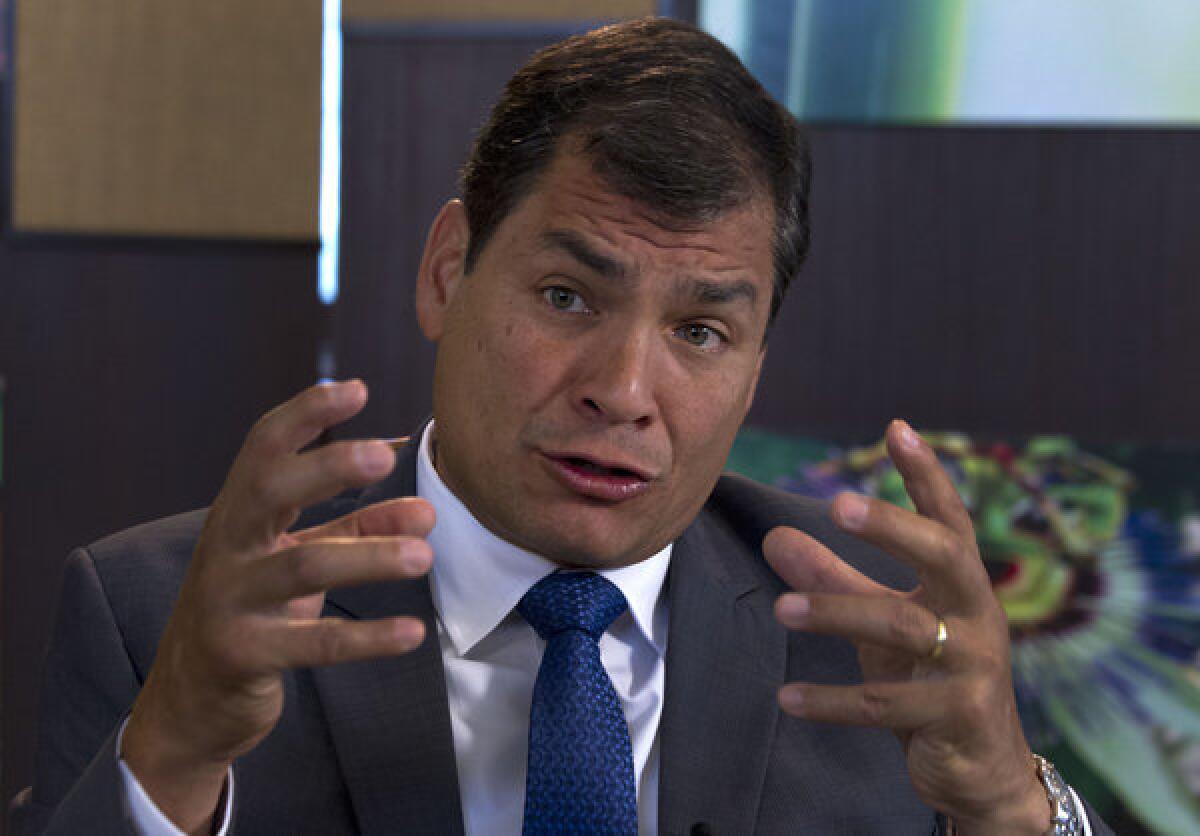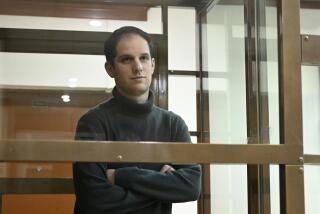Edward Snowden: Russia, Ecuador keeping NSA leaker at arm’s length

MOSCOW -- Does anyone -- besides the United States -- want Edward Snowden?
A spokesman for Russian President Vladimir Putin insisted Sunday that Snowden, who leaked American security secrets and faces arrest by U.S. authorities, “is not our issue,” even as the fugitive began his second week in Russia, all of it apparently spent at Moscow’s international airport.
Speaking on Echo of Moscow radio, presidential spokesman Dmitry Peskov addressed comments made earlier Sunday by Ecuadorean President Rafael Correa, who said Snowden is “in the care of the Russian authorities” and seemed to downplay the idea that Snowden would wind up in Ecuador, as he is apparently seeking to do.
Peskov said that, legally speaking, Snowden “has not entered the Russian Federation and hasn’t crossed its border.” Russian authorities say that Snowden has remained in a transit area of the airport and has not been through passport control, and so technically has not entered the country.
“Since this is not our issue, I don’t know what the options for the development of the situation can be, which legal and nonlegal aspects this topic involves,” Peskov added. “The only thing we do is register a very wide range of views on the issue expressed by various experts and human rights activists.”
There has been speculation that Russia might offer Snowden asylum, but Peskov seemed at pains to discount any interest the country has in the former National Security Agency contractor.
Correa, too, seemed less eager to host Snowden than had been widely assumed. In an interview with Associated Press on Ecuador’s Pacific coast, he said Snowden must assume responsibility if he broke U.S. laws, although he said the broader legitimacy of Snowden’s actions must be taken into consideration. He said Ecuador would consider an asylum request, but only if Snowden is able to make it to Ecuador or an Ecuadorean embassy to apply.
Summing up Snowden’s dilemma, Correa said: “He doesn’t have a passport. I don’t know the Russian laws, I don’t know if he can leave the airport, but I understand that he can’t. At this moment he’s under the care of the Russian authorities. If he arrives at an Ecuadorean embassy, we’ll analyze his request for asylum.”
The United States canceled Snowden’s passport before he left Hong Kong on a flight to Moscow on June 23. Snowden was believed to be planning to transfer in Moscow to a flight to Cuba, and from there make his way eventually to Ecuador. However, he has missed several flights to Cuba and has not left the transit zone of Sheremetyevo-2 airport, according to the Russian Foreign Ministry.
“Snowden is still residing in a technical room of the transit zone,” said a Foreign Ministry official, speaking on condition of anonymity. “The problem is he doesn’t possess valid documents to buy tickets for any flight anywhere or even cross the border into Russia.”
Snowden’s name was not among the passengers leaving Sunday for Havana and no tickets are booked by him for any flights in the next few days, an Aeroflot employee told The Times.
The longer Snowden remains in Russia the more awkward the situation becomes for the Kremlin and for Russian diplomacy, said Lilia Shevtsova, a senior researcher with Moscow Carnegie Center.
“The Chinese siphoned all the information out of Snowden and in a very smart fashion shook him off to Russia,” Shevtsova said in an interview. “Russia got all this second-hand information from Snowden but doesn’t really seem to have a clue how to get rid of this undesirable fugitive.”
The U.S. and Russia have serious issues on their common agenda, and neither side wants to be drawn into a new cold war over Snowden, Shevtsova said. “Sooner or later, Russia will find a way to push Snowden out to some third country,” she added. “But the longer he remains in the transit zone in Moscow, the more unprofessional Russian diplomacy looks, especially after Putin’s earlier statement to the effect that it is better both for Russia and Snowden if he leaves soon.”
Venezuelan President Nicolas Maduro, who praised Snowden as “a brave youth” and offered to grant him asylum, is scheduled to arrive in Moscow on Monday for a two-day official visit. There has been speculation that Maduro might offer to take Snowden back to Venezuela on his official jet.
ALSO:
Iran arrests paragliding Slovaks, alleges they were spying
Obama visits Robben Island, where Nelson Mandela was imprisoned
Palestinians say Kerry’s diplomatic trip ends with no breakthrough
More to Read
Sign up for Essential California
The most important California stories and recommendations in your inbox every morning.
You may occasionally receive promotional content from the Los Angeles Times.










